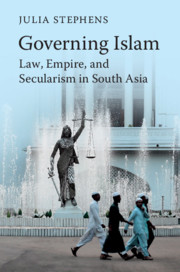Book contents
- Governing Islam
- Governing Islam
- Copyright page
- Dedication
- Contents
- Map and Figures
- Acknowledgments
- Note on Translation, Transliteration, and Abbreviations
- Map
- Introduction
- 1 Forging Secular Legal Governance
- 2 Personal Law and the Problem of Marital Property
- 3 Taming Custom
- 4 Ritual and the Authority of Reason
- 5 Pathologizing Muslim Sentiment
- 6 Islamic Economy: A Forgone Alternative
- Conclusion
- Select Bibliography
- Index
6 - Islamic Economy: A Forgone Alternative
Published online by Cambridge University Press: 08 June 2018
- Governing Islam
- Governing Islam
- Copyright page
- Dedication
- Contents
- Map and Figures
- Acknowledgments
- Note on Translation, Transliteration, and Abbreviations
- Map
- Introduction
- 1 Forging Secular Legal Governance
- 2 Personal Law and the Problem of Marital Property
- 3 Taming Custom
- 4 Ritual and the Authority of Reason
- 5 Pathologizing Muslim Sentiment
- 6 Islamic Economy: A Forgone Alternative
- Conclusion
- Select Bibliography
- Index
Summary
- Type
- Chapter
- Information
- Governing IslamLaw, Empire, and Secularism in Modern South Asia, pp. 155 - 183Publisher: Cambridge University PressPrint publication year: 2018



